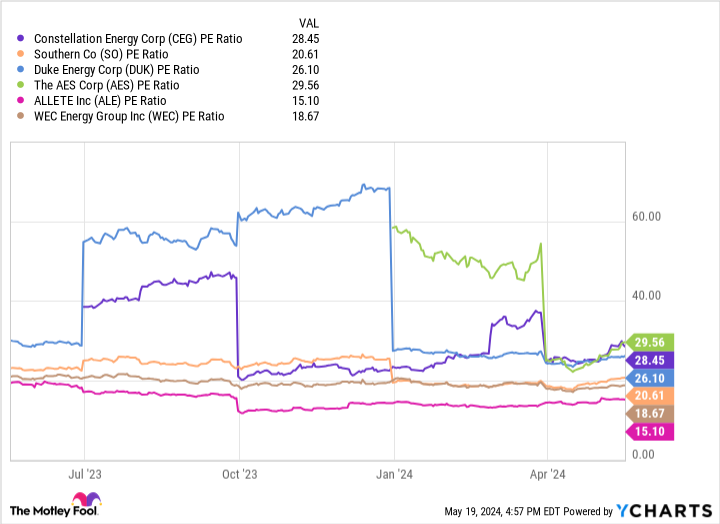
One of the biggest areas of investment among artificial intelligence (AI) opportunities is in data centers. Applications in Generative AI are fueling a new wave of demand for cloud storage, server racks, network infrastructure, and more.
While Nvidia is a leading provider of data center services, other players emerging with great solutions. Additionally, even big tech giants, like Amazon, are investing significant amounts of money in building their own data centers. Savvy investors understand that there are many opportunities in the growing data center space, a market expected to reach nearly $440 billion by 2028, according to Statista.
Stock analyst and media personality Jim Cramer was recently named Constellation Energy (NASDAQ:CEG) as the first choice for data center services. While it may seem a bit unusual, Constellation Energy is currently discussing some interesting partnerships and could very well become a big winner in the AI data center boom.
Below is an exploration of how the company could play a major role in the data center space and whether now is the right time to acquire shares.
Data centers consume a lot of energy
Data centers serve as storage units for IT architecture and network infrastructure. These buildings house larger server racks filled with hardware such as graphics processing units (GPUs), used for accelerated computing.
Although data centers play a vital role in the AI ecosystem, there is a major drawback: data centers consume a lot of electricity.
According to the Department of Energy, data centers consume between 10 and 50 times more energy than a standard commercial office. This represents about 2% of total electricity consumption in the United States.
Research of Goldman Sachs suggests that data center energy demand will increase at a compound annual growth rate (CAGR) of 15% through 2030 – and will then reach approximately 8% of total U.S. energy demand by 2030.

Constellation Energy offers a unique solution
Given that the secular tailwinds fueling AI are directly linked to increasing energy consumption – electricity in particular – data centers need an alternative solution sooner rather than later. Constellation Energy might just have the answer.
The company operates in many aspects of the energy sector, including solar, wind and natural gas. But another solution proposed by Constellation Energy is nuclear energy. And the best? Big tech is interested.
During Constellation Energy’s latest earnings conference call, management hinted that the company was in discussions with members of the “Magnificent Seven.” Microsoft And Alphabet on a possible partnership on nuclear energy data centers.
Additionally, Goldman affirmed the growing interest in nuclear power, calling it “an attractive generation source for data centers given that it is reliable and carbon-free.”
Is Constellation Energy stock a buy right now?
At the time of writing, Constellation Energy was trading at a price-to-earnings (P/E) ratio of 28.4, well above the S&P500The P/E of 24.8.
Additionally, after comparing Constellation Energy to other regulated utilities, the company appears to be trading at a premium compared to some of its competitors.


Although Constellation Energy can be expensive compared to other utilities, I view the company as an under-the-radar opportunity among AI investments. While there will be obvious investment choices among large technology and peripheral competitors in the IT infrastructure space, energy stocks should not be forgotten when it comes to AI.
For this reason, Constellation Energy could be considered a better value compared to many tech stocks that have seen their valuation multiples rise significantly over the past year as AI tailwinds have fueled AI activity. purchase.
Given that nuclear energy is attracting interest from the biggest AI companies, I wouldn’t discount the energy sector in general.
Given Constellation Energy’s relationship with big tech and its capabilities at the intersection of data center services and nuclear power, I view the stock as an attractive buying opportunity for long-term investors .
Should you invest $1,000 in Constellation Energy right now?
Before buying Constellation Energy stock, consider this:
THE Motley Fool Stock Advisor The analyst team has just identified what they think is the 10 best stocks for investors to buy now…and Constellation Energy was not one of them. The 10 selected stocks could produce monster returns in the years to come.
Consider when Nvidia made this list on April 15, 2005…if you had invested $1,000 at the time of our recommendation, you would have $566,624!*
Equity Advisor provides investors with an easy-to-follow plan for success, including portfolio building advice, regular analyst updates, and two new stock picks each month. THE Equity Advisor the service has more than quadrupled the return of the S&P 500 since 2002*.
*Stock Advisor returns May 13, 2024
Suzanne Frey, an executive at Alphabet, is a member of The Motley Fool’s board of directors. John Mackey, former CEO of Whole Foods Market, an Amazon subsidiary, is a member of The Motley Fool’s board of directors. Adam Spatacco holds positions at Alphabet, Amazon, Microsoft and Nvidia. The Motley Fool holds positions and recommends Alphabet, Amazon, Constellation Energy, Goldman Sachs Group, Microsoft and Nvidia. The Motley Fool recommends Duke Energy and recommends the following options: long January 2026 $395 calls on Microsoft and short January 2026 $405 calls on Microsoft. The Motley Fool has a disclosure policy.
Forget Nvidia: Jim Cramer Says This Company May Be Poised To Profit From Artificial Intelligence (AI) Data Centers was originally published by The Motley Fool


